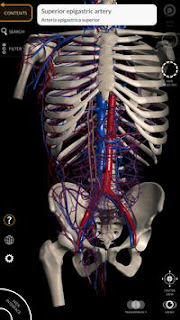Anatomy 3D Atlas
This app is freely downloadable, however in-app purchase is required to unlock the contents.
Some of the contents are always freely accessible enabling you to try the app properly.
"Anatomy 3D Atlas" allows you to study human anatomy in an easy and interactive way.
Through a simple and intuitive interface it is possible to observe every anatomical structure from any angle.
The anatomical 3D models are particularly detailed and with textures up to 4k resolution.
The subdivision by regions and the predefined views facilitate the observation
and the study of single parts or groups of systems and the relationships between different organs.
"Anatomy - 3D Atlas" is an application aimed at medical students, doctors, physiotherapists, paramedics, nurses, athletic trainers and in general anyone interested in deepening their knowledge of human anatomy.
This app is a fantastic tool to complement classic human anatomy books.
ANATOMICAL 3D MODELS
• Musculoskeletal system
• Cardiovascular system
• Nervous system
• Respiratory System
• Digestive System
• Urogenital system (male and female)
• Endocrine system
• Lymphatic system
• Eye and ear system
SIMPLE AND INTUITIVE INTERFACE
• Rotate and zoom in each model in 3D space
• Filter to hide or display each system
• "Search" function to easily find every anatomical part
• Option to hide or isolate each model
• "Smart" rotation which moves the center of rotation automatically
• Transparency function
• Visualization of muscles through levels of layers from the superficial ones down to the deepest ones
• Show/Hide UI interface (very useful with small screens)
INFORMATION
• By selecting a model or a pin, the related anatomical term shows up
• Description of the muscles: origin, insertion, innervation and action (currently only in English)
MULTILINGUAL
• The anatomical terms and the user interface are available in 11 languages: Latin,
English, French, German, Italian, Portuguese, Russian, Spanish, Chinese, Japanese and Korean
(the full description of the muscles is in English only)
• The anatomical terms can be displayed in two languages simultaneously








